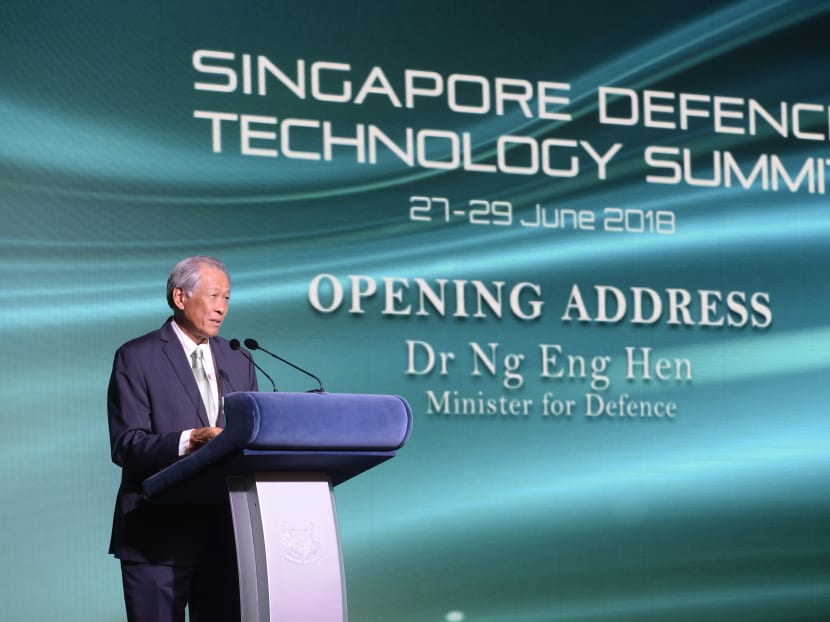Public and private sector partnerships in defence technology throw up ‘tough questions and moral dilemmas’: Ng Eng Hen
SINGAPORE – With governments ploughing huge investments in technology and increasingly working with the private sector to develop defence capabilities, there are risks and dilemmas which countries have to grapple with, said Defence Minister Ng Eng Hen on Wednesday (June 27).

In the wrong hands, new technologies could be used to undermine nations’ “collective security”, said Singapore's Defence Minister Ng Eng Hen.
SINGAPORE – With governments ploughing huge investments in technology and increasingly working with the private sector to develop defence capabilities, there are risks and dilemmas which countries have to grapple with, said Defence Minister Ng Eng Hen on Wednesday (June 27).
In the wrong hands, new technologies could be used to undermine nations’ “collective security”, for example, said Dr Ng, who was speaking at the opening ceremony of the inaugural Singapore Defence Technology Summit at the Shangri-La Hotel.
Already, terrorists and their networks use encrypted applications to orchestrate terrorist plots, or conduct surveillance through drones, which can also be used to deliver improvised explosive devices.
The potential of artificial intelligence (AI) and the ethical implications of machines replacing human decision-making are complex issues as well, Dr Ng noted.
He also cited the ongoing discussion on data privacy violations by social media.
“Crowdsourcing is the key enabler in this new technology revolution – whether of assets such as bicycles, homes or personal commodities such as money, time or data itself,” he said. “Over-regulation will cripple this new enabler and dissipate of power of data aggregation. Can and how do we attain the golden mean between sharing and privacy?”
These are “tough questions and moral dilemmas to address, with often no easy or cost free answers”, he noted.
Nevertheless, he also provided examples how Singapore is approaching the conundrum. In the case of drones, for instance, the authorities have demarcated one-north as a “sandbox environment” to test unmanned aircraft solutions.
There, multiple parties from government, Singapore universities, overseas companies such as Airbus, and local industry players such as Singtel and ST Aerospace collaborate on novel drone applications for parcel delivery, security checks and building inspections, said Dr Ng.
In spite of the risks and dilemmas, society can reap benefits from investments in research and development (R&D) programmes in defence — and these are not confined to the military space, Dr Ng noted.
He cited the Internet’s predecessor, the Advanced Research Projects Agency Network (ARPANET) in 1969, which started out as a United States government initiative to build a command and control network that would be resilient to nuclear attacks.
Last year, private sector funding in R&D hit a record high of USD$702 billion, more than Government spending, Dr Ng said.
He added that the ratio of private to public R&D investments is currently about 2:1 in the US and Europe. In China, the ratio is 3:1.
“There is another shift too – in geography. Asian companies’ R&D spending has more than quadrupled over the past decade,” said Dr Ng. “China now has the second largest R&D spending in the world. The discovery and application of new technology is shifting new epicentres from the US and Europe, to the Middle East and Asia.”
The involvement of the private sector involvement will likely quicken the pace of discovery and application of commercial technologies, “with shorter development cycles”, Dr Ng said. He pointed to the example of the Joint Strike Fighter Programme — involving several countries — where aerospace company Lockheed Martin is looking to “employ an agile approach for software development with new capability increments every six months… (which was) previously unthinkable”.
Increasingly, governments will look to commercial companies for solutions, he added.
He said that many countries’ defence ministries use commercial software as the default to run their human resource enterprise services. In China, the government is partnering Tencent to integrate WeChat with its electronic identification system.
In Singapore, the Defence Science and Technology Agency (DSTA) - the central procurement agency for the Ministry of Defence (Mindef) – and manufacturers such as Airbus and Boeing are collaborating in digital technologies such as 3D-printing and data analytics.
Tech companies such as Google, Microsoft and Amazon are also “aggressively” offering cloud-based services to governments, to reduce their costs in application development and infrastructural investments, said Dr Ng.
Meanwhile, the Singapore Armed Forces is also tapping on AI to enhance its operations and work with commercial companies. For instance, it has deployed unmanned watch towers on Jurong Island to watch over key installations.
Organised by the DSTA, the inaugural summit runs from Wednesday to Friday.
Themed “Impact of the Fourth Industrial Revolution on Defence and Security”, the event will see a gathering of about 400 defence technology policymakers, top corporate chiefs, academics and entrepreneurs from over 15 countries.
Among the speakers include General (Ret) Keith Alexander, founder and CEO of IronNet Cybersecurity; Dr Hong Won-Pyo, president and CEO of Samsung SDS; and Dr Kira Radinsky, the chief scientist and director of data science of eBay.
Dr Ng said that Singapore “can play a useful role in this region and even globally as a place where progressive minds meet, where ideas flourish, and new paths are forged’.
He added: “When Singapore was founded in 1965, we did not have this aspiration to be such a place. It would have been misplaced to think that far and aim that high when we were too poor with many communal problems, even existential challenges to solve.”
Even as Singapore developed, it did not proffer itself as a venue for historic meetings that have been held here, said Dr Ng, who cited the 2017 Xi-Ma meeting and the recent Trump-Kim summit.
“But if we can play that small role to advance the cause of peace and to enable progress of humanity, then Singapore ought to do it and do it well,” he said.






